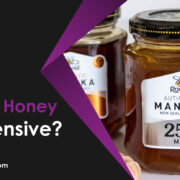Why is Manuka honey so expensive; the reason behind this is its health benefits due to the nutrients present in it. In this blog post, you will discover the difference between Manuka and regular honey. Moreover, this post will also describe some reasons why is Manuka honey so expensive.
In addition, this article will assist you in understanding “Is Manuka honey Eco-friendly”. Furthermore, you will explore the meaning of Raw honey. Indeed, this platform will explore some details regarding how honey Pasteurization works, why is Manuka honey good for you, and why the price differs between Manuka brands.
Table of Contents
What is Manuka Honey?
Manuka honey is a precious and rare thing that is made from Leptospermum scoparium or the manuka tree’s nectar. It is produced only in New Zealand and Australia, where manuka trees are naturally present. But now manuka honey can be produced worldwide.
Moreover, this mono-flavor honey has antimicrobial and anti-bacterial properties, which is why it is used to cure sore throats, aid in wound healing, and resolve digestive issues. It has a strong earthy aroma and flavor, which is the reason it is used as a sugar substitute.
| Name | Manuka Honey |
| Produced in | New Zealand and Australia |
| Source | Leptospermum scoparium tree flowers |
| Taste | Bitter |
| uses | cure sore throats, aid in wound healing, and resolve digestive issues |
What is the Difference Between Manuka Honey and Regular Honey?
Manuka honey is different from regular honey in various ways, but a few of them are discussed below.
Types of Flowers
Manuka honey is produced by bees that collect pollen and nectar from manuka trees in exclusive amounts. On the other hand, regular honey-producing bees gather pollen and nectar from different types of flowers.
Medicinal Properties
According to the research, manuka honey has more anti-inflammatory and antibacterial properties than regular honey. These characteristics of this honey make it helpful in the treatment of burns, wounds, coughs, and colds.
Tastes
Manuka honey has a strong smell and bitter taste, while regular honey is sweet. The reason behind this taste of manuka is the higher levels of methylglyoxal compounds. In contrast, regular honey has a low quantity of methylglyoxal compounds, and to improve the taste, it may contain sweeteners or additives.
Why is Manuka Honey So Expensive?
Why is Manuka honey so expensive compared to other types? The arguments include its rarety in production. It has unique properties, which makes it different from other honeys. These properties include;
- High concentration of MGO (methylglyoxal)
- Graded levels of MGO
- Used for different medicinal purposes
- More costly than regular honey
- Manuka plants are short-term plants
Another reason may be the difficulties that bees can face while locating and accessing manuka sites. The manuka trees have a short blooming time and weather, mother nature, and events. These are some factors that can make a few seasons non-productive.
Manuka Honey is Unlike Other Types of Honey
Manuka honey is richer and darker than most types of regular honey. To make it precious, this honey has a sharper taste that enhances its significance. This honey offers antibacterial properties, while other types of honey provide minerals, vitamins, and many other benefits.
Manuka honey delivers additional health advantages and higher levels of methylglyoxal. These characteristics make it valuable in the world of natural medicine.
Comes Solely From the Manuka Flower
The Manuka flower is the only one from which the bees collect nectar and get pure Manuka honey. If bees collect nectar from manuka as well as from other flowers nearby, then the honey would be a Manuka Blend.
To ensure purity, or bees gather nectar only from Manuka flowers, beehives are placed in isolated locations that contain high concentrations of Manuka flowers. This is often done with the help of a helicopter. The result would be Mono-floral Manuka honey.
Manuka Flowers Only Bloom for 2-6 Weeks
Manuka flowers bloom only for 2-6 weeks due to short blooming season. That is the reason the busy bees only have 14 days to make enough honey for the whole year. Bees are too busy to make a jar of Manuka honey, and they take 22,700 rounds to collect nectar.
Solely From New Zealand
Manuka flowers are found in selected regions of New Zealand, especially in isolated forests and hills. In addition, Manuka is a sensitive wild shrub to changes in climate, weather, and pollution. As the Manuka bush grows isolated, the resulting honey will be as healthier.
Market Demand and Consumer Perception
The market outlook for Manuka organic honey is positive, with increasing user demand and awareness for natural products. Its health benefits have gained a lot of attention among users.
This has increased the market demand for organic Manuka honey as people search for natural products and traditional medicine alternatives. In the US, consumers prefer to buy this honey online, but in Canada, finding high-graded Manuka is very difficult.
Limited Production Window
Manuka honey is made only from the flowers of the Leptospermum scoparium tree. This tree produces flowers, and bees remain busy during that time. The nectar supply for the manuka honey is in a limited edition window.
It can made for about one month each year. The process of honey production and harvesting can be very interesting. To do this, if the method is not used properly, the honey bees can die, or their hives can be damaged.
Not All Manuka Flowers Create High Levels of MgO
Not all Manuka flowers create nectar that has a high level of Manuka’s Mgo. Despite all the work of collecting nectar from this rare flower to make a special honey. It is vital to focus on the grading of Mgo shown on the jar of this honey.
The higher the number, the more powerful honey will be. To ensure every jar’s grading quality, the Honeyman uses the MgO grading system.
Extensive Authentication Process
The Ministry of Primary Industries observes monofloral Manuka honey as among New Zealand’s high-valued experts. That is the reason the Honeyman tries to save the purity of the manuka honey. To determine the quality of a few factors, like MGO levels, tests are taken to ensure authentication and power.
You can get this precious honey with low levels of MGO or very high levels like MGO 850 + Manuka honey. The most vital advantage generally becomes shown when a minimum of 200 + MGO is present.
Raw and Unpasteurised
Raw honey is kept in its natural condition. The pasteurization process can bring multiple degrees of danger to the honey. Consuming unpasteurized honey is not a health risk. Raw honey that exists in beehives. Unpasteurized honey has not been heated, which can affect its natural characteristics.
Raw also means no other ingredients are added to it. Before packing, it is simply strained, which means that all the beneficial antioxidants and nutrients that nature created are retained. The nectar of the manuka flower in New Zealand’s pristine forests is the source of authentic raw manuka honey.
Is Manuka Honey Eco-friendly?
Despite having several health advantages, Manuka honey’s production process has the same environmental and ethical concerns as regular honey. Undoubtedly, the vegan honey alternatives are not made by bees but are more bee-friendly and eco-friendly.
Some Manuka honey makers have attempted to implement suitable practices for their companies. One Manuka honey maker in New Zealand “Buzzstop Bee & Honey Centre” uses environmentally friendly techniques for its products. This business launched an advocacy campaign that stimulates other beekeepers to implement sustainable methods.
What Does It Mean for Honey to Be “raw”?
Raw honey comes directly from beehives. Usually, the beekeepers just filter the honey to remove the small bits of waste, including beeswax, pollen, and dead bee parts. They do not pasteurize the raw honey. In appearance, the raw honey seems to be opaque or cloudy as it contains such extra contents, but it is still safe to eat.
How Does Honey Pasteurization Work?
Honey Pasteurization is a process that is completed under heat to remove the yeast. To achieve a uniform texture and color or to prevent possible fermentation & granulation, the pasteurization process is done.
This process is done for regular honey at 160 degrees Fahrenheit and then cooling rapidly. The honey is extremely sensitive to heat. As a result, the pasteurization process destroys some of the healthy components in honey, including those that help it enhance health.
The majority of honey gets pasteurized to increase its lifespan and attain a uniform appearance. That being stated, pasteurization is needless and lowers the quality of honey when beekeeping is done properly, responsibly, and with love or respect for the bees & their natural process.
For example, many honey producers actively dehydrate the honey from the hives to enhance the overall process speed.
Why is Manuka Honey Good for You?
Manuka honey earns its high price tag because of nutrients that support overall wellness on top of rarity and beekeeping practices. In addition, there are several reasons why is Manuka Honey good for you, but a few of them are discussed below.
Natural prebiotics
Manuka honey contains a wide range of natural prebiotics that support the digestive system and gut health. Moreover, the best practice to start a vacation day is to take a spoon of Manuka honey on an empty stomach.
MgO’s antibacterial properties
Manuka has higher levels of MGO, unlike other types of honey. MGO offers antibacterial properties because it is an organic nutrient. This naturally occurring substance supports the immune system and assists you in maintaining the best health.
Naturally soothing
Manuka honey is enriched with nutrients and contains natural soothing properties. Moreover, when you are not feeling well, and your wellness needs a little booster, manuka honey is one of the best natural medicines. As the cold season arrives, manuka must be stocked in your cabinet if you want to stay healthy.
Antioxidants
Antioxidants found naturally in manuka honey aid in defense against environmental stresses. These antioxidants assist in boosting your health because they aren’t pasteurized or treated.
Why Does the Price Differ Between Manuka Brands?
UMF (Unique Manuka Factor) plays an important role in determining the pricing and quality of Manuka honey. An organization, UMF Honey Association, has established a grading system to achieve honey purity. But also guarantees its freshness, authenticity, and effectiveness for the duration of storage.
UMF ratings for manuka honey include 5 +, 10 +, 20 + or higher. The higher the grade, the more efficient the honey. Indeed, a premium price is tagged to a higher-rated Manuka honey due to its potential health benefits and enhanced quality.
For comparison, UMF brands also determined their MGO content (as an example, UMF5+ = MGO83+). Furthermore, the UMF also ensures that the honey has been made and packed under very strict New Zealand’s Manuka rules. In other parts of the world, the MGO grading can applied but likely not fulfill the Manuka honey standards.
Conclusion
Why is Manuka honey so expensive? The main reasons are its health benefits, strict authentication process, limited production, and sustainable harvesting practices. In this blog post, you can discover everything regarding Manuka honey’s worth.
Moreover, you can get some reasons why Manuka honey is so expensive. Indeed, this post delivers some detail regarding how honey pasteurization works. Furthermore, you can learn why Manuka honey is good for the user. In addition, this article enhances your knowledge about manuka’s higher prices than other honey brands.








Comments